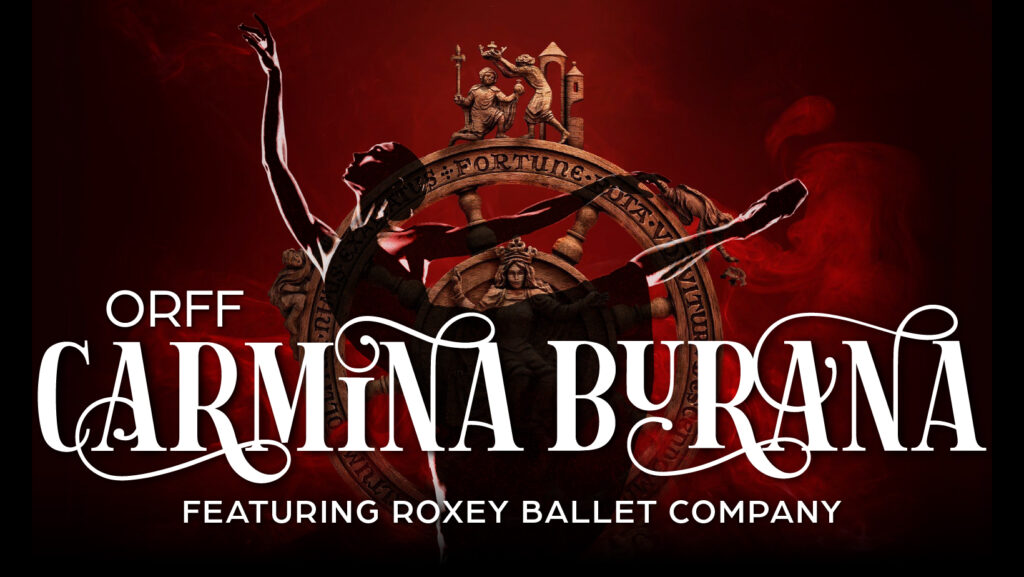Reflections on a Requiem
Reflections on a Requiem
Crystal Glenn, soprano
Sylvia Leith, mezzo-soprano
Alex Longnecker, tenor
Mark Hightower, bass
March 17, 2024
4:00 p.m.
Richardson Auditorium
Princeton University
Reflections on a Requiem
Crystal Glenn, soprano
Sylvia Leith, mezzo-soprano
Alex Longnecker, tenor
Mark Hightower, bass
March 17, 2024
4:00 p.m.
Richardson Auditorium
Princeton University
Click above to listen to the Director's Notes
Use Up/Down Arrow keys to increase or decrease volume.
Musicologist Scott Burnham produced an unassumingly slim but exceedingly rich volume titled Mozart’s Grace in 2013, the year after I began my tenure with Princeton Pro Musica, and the year after we first performed Mozart’s Requiem, at my first concert. Burnham’s book opens with a caveat from the theologian Karl Barth: “Whoever has discovered Mozart even to a small degree and then tries to speak about him falls quickly into what seems rapturous stammering.” Indeed, it’s difficult to find words on par with music that, in Burnham’s estimation, “seems somehow pre-made, [which] glows with a self-sufficiency that has less to do with ‘unity’ and more with apartness: untouched, untouchable.”
I’ll try, however foolhardy the attempt may be, to say a few things about the music (and I’d be a fool not to share some of Burnham’s words). But first, when engaging with Mozart’s Requiem, its sketchy, shadowy origin story demands that one say a bit about the context of its creation. In 1791, Mozart was hard at work on two operas – The Magic Flute and La Clemenza di Tito. But in spite of his music’s being universally celebrated and performed today, in his lifetime Mozart’s music met mixed success, leaving him and his family flirting sometimes with impecuniousness. So when a wealthy count offered, upfront, half a handsome commission fee for a setting of the Latin Requiem text, Mozart felt compelled to accept the additional work. He started writing at the end of the summer of 1791 but then paused to oversee and conduct the premiere of La clemenza di Tito in Prague. At some point early that fall, he began to show signs of physical and mental ill health. Though he picked the Requiem back up in September upon return from Prague, in mid-October his wife Constanze took the score away from him, concerned about his burying himself obsessively in the work, spooked by his premonition that he might be writing the piece for his own death. He got back to work at the end of November, but would be dead by 5 December 1791, leaving the Requiem unfinished. The first two movements were performed at a Requiem Mass for Mozart himself five days later. The widowed Costanze, in desperate need of the remainder of the commission, saw that the work was completed by Mozart’s students, namely Franz Süssmayer. The commissioned piece was delivered to the Count, who presented the premiere in 1793.
That the work was shrouded in mystery and shadowed heavily by Mozart’s own death surely has something to do with its prominent place in the repertoire. The tragedy of the ill-fated composer’s untimely death makes the possibility that he was knowingly composing his own Requiem too captivating to resist. Beguiling questions of authorship resulting from the incomplete state of the manuscript tighten the heartstrings of musicologists eager to discover what the dying composer intended for his final musical statement. Long before Amadeus reinserted the piece into the popular imagination, Mozart’s Requiem held musicians and audiences in thrall and received performances at memorials for Haydn, Beethoven, Chopin, and Napoleon, among others.
Performing the piece requires one to choose: since we don’t have an all-Mozart version, which version will we do? Beyond the Introit, Mozart’s manuscript contained the vocal parts for the Kyrie through the Hostias, with sketches and indications for various aspects of the instrumental parts and orchestration. It contains nothing for the Sanctus, Benedictus, and Agnus Dei as well as the final Communion. For most of the Requiem’s history, conductors and ensembles had no choice but to perform Süssmayer’s subpar attempt to flesh out the torso into something whole. We can presume that Süssmayer’s attempt honors some sketch materials or instructions given verbally by Mozart himself, but it is bruised by errors in harmony and voice leading uncharacteristic for Mozart. More problematic, for me, at least: The orchestration in Süssmayers’ familiar completion is, at its very best, ample and sonorous; at its worst, turbid, lumpen, and unimaginative. In more recent times other scholars have fashioned new “completions” of the work in attempts to improve upon perceived shortcomings in Süssmayer’s. Princeton Pro Musica and I present one such attempt by pianist and Mozart scholar Robert Levin, who used a variety of materials, including Süssmayer’s completion, to create an alternate version that ameliorates some of the deficiencies of Süssmayer’s. Levin states that “the goal was to revise not as much, but as little as possible, attempting in the revisions to observe the character, texture, voice leading, continuity and structure of Mozart’s music. The traditional version has been retained insofar as it agrees with idiomatic Mozartean practice.” From my vantage point as a conductor and professional orchestrator, Levin’s completion eschews some of the more opaque textures of other completions, leaving more of Mozart’s hallmark translucence, gifting the instrumentalists more of the feel of Mozart’s easy filigree under their fingers.
But enough about all that. Mystery, lore, and musicology are not nearly as captivating as Mozart’s actual music. As a child, Mozart traveled the European continent, absorbing regional styles and fashions, reimagining them in his own voice. The resulting musical style has been hailed by generations of performers, teachers, and musicologists as the paragon of Enlightenment elegance and balance. Those Mozartean characteristics grace the Requiem, but the work also reveals the composer’s abiding interest in the counterpoint and affekts of the Baroque era and the technical prowess and artistic determination to explore it.
And what better inspiration to deploy these contrasting musical inclinations than the Latin Requiem Aeternam. Throughout, both within and among movements, Mozart, who in 1791 hadn’t engaged sacred texts in almost eight years but had fully formed as an opera composer and musical dramatist, capitalizes completely on the possibilities of his appointed text. Just thirty-six yet staring down his demise, feverishly inking what he thought might be his last ever musical statement, Mozart draws taut drama from the juxtaposed promises and perils of Catholic eschatological dogma. His music winches the pull between the sublime but impersonal salve of liturgical ritual and the individual believer’s deathbed desperation, the pristine peace of heaven and the acrid flames of hell. Salvation and damnation stand shoulder to shoulder.
Mozart’s voice comes through most clearly in those components of the Requiem he managed to complete in their entirety before his death. The first two sections are the only ones we have completely in Mozart’s own hand. Here, the atmosphere is unmistakeable. It opens not with the first person point of view but with the more omniscient tone of group prayer. The pearly softness of flutes and plangent sound of oboes are not to be heard here. Instead, Mozart scores the Requiem for two bassoons with two basset horns—a lower-pitched cousin of the clarinet. The woody tenor of these four instruments is revealed to us in a slow motion chain of suspensions, keening above the short, searching foot falls of the strings’ offbeats. Burnham’s description is too good not to share whole:
[It’s] richly shadowed, removed from the world, yet not ominous. The effect is much like stepping from the light of day into a cathedral. Once again the ancient compact is revealed, and all else falls away. This is not the stunned stasis of the awestruck individual but rather the enveloping and shared aura of solemn ritual. And yet even this shuns the usual invitation to be lugubrious and instead remains buoyant—the harmonic turns argue for mobility, for a lighter tread, even . . . for a poignant sweetness. And the backbeat chordal texture lightens what would be a trudging rhythm—we step not with heavy chords on our backs but with the bass line under our feet. . . . Mozart makes reference to older models of religious music in his Requiem, lending his own style a new solemnity. But the lightness remains. Trombones mark the entrance of the voices with three upbeat quarter notes, as though heralding the entrance of the priests, reminding us once again of the special role of trombones in sacred music, the thrill of their dusky grandeur. Trumpets and drums join on the last upbeat, and now the majesty of Death is upon us, with instantaneous effect.
This dramatic treatment continues apace. The first few stanzas of the famous Dies Irae sequence depicting the “day of wrath” gallop out of the gate, with the full choruses’ fever-pitched sense of dread stacked in big bloc chords, surrounded by hard pumping string figures and fanfaring trumpets. The subsequent Tuba Mirum presents the more stern voice of a solo trombone, and the more subjective perspective of the quartet of soloists, entering one by one. That movement’s quiet ending is shattered by the Rex Tremendae’s “tremendous majesty”—all stomping, goose-stepping crispness that nevertheless yields to a heart-shatteringly simple plea from the chorus: “save me.” The interweaving string lines of the Recordare unspool like dancers pitter-pattering around a stage to weave silken ribbons around a central pair—basset horns or pair of vocal soloists—mirroring each other in slow-arcing arm movements. The Confutatis makes its contrasts even more stark, exploiting extremes in articulation, register, and voicing. The tenors and basses bellow about their being “confounded” and “sentenced to the acrid flames of hell” atop a relentless unison churn in the strings. The sopranos and altos respond with a hushed plea, “hear me,” floating, ungrounded, above fluid violins. Burnham suggests that, “in fact, Mozart deploys the genders in Confutatis as if separating animus and anima, in a kind of psychic titration, the male principle shouting downward amid the din of damnation, the female floating up like Goethe’s eternal feminine.” The back and forth yields, then, with a series of genuflecting choral passages in gentle prayer. The text of the Dies Irae sequence ends with the weeping Lacrymosa. The strings, in a series of pulses and sighing responses, anticipate the poignant, lyric lines of the chorus. What follows is a rapturous, sustained ascent and crescendo—the last bars we have in Mozart’s hand.
Levin’s completion supplements the end of the Sequence with a fugal “amen,” based on a fragment in a sketch leaf from the end of Mozart’s life. Levin’s Amen has an idiosyncratic voice that isn’t quite Mozart’s but at least follows custom and provides the necessary ballast to counterbalance the intensity of the preceding movements. The non-mozartian Sanctus, Benedictus, and Agnus Dei follow, and the whole work concludes with music reprising the opening.
Somehow, though, the pathos of the Lacrymosa stays with us, especially that intense crescendo. Burnham, again: “We ascend, rising through harmonic layers of hopeful color, rising still into harsher light, into the glare of the judgment to come, and upward still, onto the home dominant of the entire Requiem. Mozart went no further. As for us, we may well drop from the zenith of this dominant back into the beginning of the Introitus, as though to cycle forever through these sacred scenes, as though to complete the Requiem ourselves, to make it endlessly whole.” The rich text of the Requiem is laden with possibility for a composer of Mozart’s imagination and deftness, and his setting is one of the finest, even as it stands incomplete and as its modest proportions are dwarfed by later composers’ creations. Perhaps it’s the tragedy surrounding its creation or the mystery of its being unfinished. Perhaps it’s because of the way its music taps something so palpably human in its reach for something beyond us. For whatever reason, the Requiem, more so than the unfinished C Minor Mass, keeps us wondering, returning to the well every so often to re-imagine what might have been, to try, as Burnham so beautifully imagines, to “make it endlessly whole.” Fortunately for all of us, the scraps we have will forever slake our thirst for Mozart’s matchless music. Rest assured, this won’t be our last draw.
GLASSBROOK VOCAL ENSEMBLE
St. Francis' Prayer
Margaret Bonds (1913-1972)
Regina Caeli
Vicente Lusitano (c. 1520-1561)
The Chariot Jubilee
Nathaniel Dett (1882-1943) ed. Jason Max Ferdinand
DARIAN CLONTS | tenor
PRINCETON PRO MUSICA & GLASSBROOK VOCAL ENSEMBLE
Portraits: Douglass & Tubman
Jasmine Barnes (b. 1991)
Intermission
PRINCETON PRO MUSICA
Requiem in D minor, K. 626
Wolfgang Amadeus Mozart (1756-1791)
completed and edited by Robert D. Levin
- Requiem
- Kyrie (Chorus)
- Dies Irae (Chorus)
- Tuba Mirum (Solo Quartet)
- Rex Tremendae (Chorus)
- Recordare (Solo Quartet)
- Confutatis (Chorus)
- Lacrimosa (Chorus)
Amen (Chorus) - Domine Jesu (Chorus and Solo Quartet)
- Hostias (Chorus)
- Sanctus (Chorus)
- Benedictus (Chorus and Solo Quartet)
- Agnus Dei (Chorus and Solo Quartet)
- Lux Aeterna (Chorus and Soprano)
CRYSTAL GLENN | soprano
SYLVIA LEITH | mezzo-soprano
ALEX LONGNECKER | tenor
MARK HIGHTOWER | bass
 Jasmine Arielle Barnes is a promising young composer and vocalist whose work has been performed world-wide. She is a multifaceted composer who embraces a variety of genres, formats, and instrumentations with a specialty of writing for the voice. She recently won a Capital Emmy for Diversity/Equity/Inclusion - Long Form Content for the Maryland Public Television documentary film, Artworks: Dreamer which featured her piece, Portraits: Douglass & Tubman.
Jasmine Arielle Barnes is a promising young composer and vocalist whose work has been performed world-wide. She is a multifaceted composer who embraces a variety of genres, formats, and instrumentations with a specialty of writing for the voice. She recently won a Capital Emmy for Diversity/Equity/Inclusion - Long Form Content for the Maryland Public Television documentary film, Artworks: Dreamer which featured her piece, Portraits: Douglass & Tubman.
Barnes is currently a composer-in-residence for American Lyric Theater and previously held residencies as a composer fellow at Chautauqua Opera, and composer-in-residence with All Classical Portland. Her work is in high demand, with recent commissions from respected institutions throughout the country including Washington National Opera (in celebration of the Kennedy Center’s 50th anniversary), Bare Opera, Resonance Ensemble, Tapestry Choir, City Works Cleveland, LyricFest Philadelphia, Baltimore Choral Arts, Burleigh Music Festival, Symphony Number One, Baltimore Musicales, and The Voic(ed) Project, amongst others.
Last season’s engagements included the world premiere of Plumshuga at STAGES Houston, anarrangement of spirituals commissioned by Orpheus Chamber Orchestra to début at Carnegie Hall performed by Karen Slack and Will Liverman, a composition for Lawrence Brownlee’s recital tour Rising, and a new song cycle commissioned by world-renowned tenor Russell Thomas to be performed at Los Angeles Opera. This season, Jasmine’s work will have world premieres at Third Practice, Chicago Symphony Orchestra, Apollo Chamber Players, and Opera Theatre of Saint Louis.
Other recent commissions include Might Call You Art for CityMusic Cleveland, Portraits: Douglass & Tubman for Baltimore Choral Arts Society, Maternità for Takesha Meshé Kizart and Anima Mundi Productions, and I Will Follow You into the Dark with American Lyric Theatre.
Her 10-minute opera entitled The Late Walk commissioned by Bare Opera as a part of the Decameron Opera Coalition has been archived in the Library of Congress. Examples of The Late Walk are used as a subject and study feature in a book called “Narrative Oper” by Sonja Dierks, a German author. Barnes received the 2021 Florence Price award for composition, was named a winner of the Black Brilliance award by The Pleiades Project, recognized as the Gwendolyn J Brinkley Fine Arts First Place Award Winner of Alpha Kappa Alpha Sorority, Inc. South Central Region 2021, and named a finalist of All Classical Portland’s Recording Inclusivity Initiative.
Her catalogue of works is frequently performed by high-profile artists and organizations including Fresno Philharmonic Orchestra, Portland Opera, Tulsa Opera, Hampsong Foundation (at the Elbphilharmonie), Tennessee State University Meistersingers, University of North Iowa, University of Memphis, Indiana University (graduate song literature class), Karen Slack, Leah Hawkins, Leonna Mitchell, Marquita Lister, Gabrielle Gilliam, Alexandria Crichlow, and Christian Simmons, among many others.
Barnes is also an established educator. She is the former Head of Compositional Studies and Jazz Voice Studies at Booker T Washington High School for the Performing and Visual Arts in Dallas, TX. Her work as an educator has garnered a variety of accolades. She is a five-time recipient of National Young Arts Foundation’s Educator Award; a Teacher Recognition award recipient from American Composer’s Forum; and a NextNotes High School Music Creator Competition award winner. Additionally, she partnered with AT&T Performing Arts Center in creating a composition competition for her students to compose an original piece for the acclaimed chandelier in the AT&T Performing Arts Center in Dallas, TX, home of the Dallas Opera.
Barnes holds a Bachelor of Arts and Master of Arts in Music from Morgan State University in Baltimore, Maryland where she studied composition under Dr. James Lee III. She proved her musical prowess in her début composition concert entitled “Reality Race and Religion.” She was the first composition major at Morgan State University, thus hosting the first composition recital and setting a high bar for those to follow.
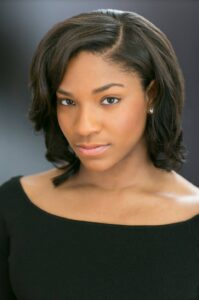 American soprano, Crystal Glenn, is sought after for her scintillating stage presence and keen ability to connect with her audiences. Most recently, she has appeared in leading roles with Taconic Opera as Zerbinetta from Strauss’ Ariadne auf Naxos, Blonde from Mozart’s Die Entfürung aus dem Serail, and Oscar from Verdi’s Un ballo in maschera.
American soprano, Crystal Glenn, is sought after for her scintillating stage presence and keen ability to connect with her audiences. Most recently, she has appeared in leading roles with Taconic Opera as Zerbinetta from Strauss’ Ariadne auf Naxos, Blonde from Mozart’s Die Entfürung aus dem Serail, and Oscar from Verdi’s Un ballo in maschera.
This past season, Ms. Glenn performed with Carolina Performing Arts (Chapel Hill, NC) and Spoleto Festival USA (Charleston, SC), to premiere the Pulitzer Prize winning opera, Omar, by composers Rhiannon Giddens and Michael Abels.
Other operatic highlights include: Julie (cover) in Rhiannon Giddens’ & Michael Abels’ new opera, Omar with Carolina Performing Arts, Lauretta from Puccini’s Gianni Schicchi with Taconic Opera, Despina and Pamina from Mozart’s Die Zauberflöte and Così fan tutte, respectively, with New York Opera Conservatory in Westchester County, NY, Suor Osmina in Puccini's Suor Angelica with Martina Arroyo’s Prelude to Performance, Vixen in Janáček’s The Cunning Little Vixen, Rebecca in Nico Muhly’s Two Boys, Monica in Menotti’s The Medium, Ilia from Mozart’s Idomeneo and Susanna from Le Nozze di Figaro, with New York Summer Opera Scenes.
Ms. Glenn holds a Bachelor of Music degree from Westminster Choir College in Princeton, NJ and a Master of Music degree from Manhattan School of Music, in Vocal Performance.
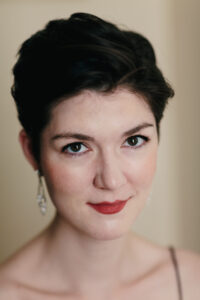 Sylvia Leith, mezzo-soprano, is a soloist and consort singer praised for her “plangent” and “creamy” tone and “stirring” delivery (Washington Classical Review, Cultural Voice of North Carolina). She has appeared as a soloist with the Baltimore Symphony Orchestra, Washington Bach Consort, the Oregon Bach Festival, Tempesta di Mare, American Classical Orchestra, Bach Akademie Charlotte, Emmanuel Music Baltimore, the IN Series, Florilegium Chamber Choir, and Washington Young Sinfonia, in repertoire ranging from Bach, Handel, and Purcell to Mahler, Elgar, and Copland. Solo highlights of her 2023–24 season include Messiah with the Choir of St. Thomas Fifth Avenue, Bach’s Weihnachts-Oratorium with Washington Bach Consort, Mozart’s Requiem with Princeton Pro Musica, Duruflé’s Requiem with St. John’s Music Tulsa and Christ Church Wilmington, and Bach cantata programs with Cantata Collective and Bach Vespers at Holy Trinity (New York City). Her operatic roles include Nerone in Monteverdi’s L’incoronazione di Poppea, the title role in Handel’s Giulio Cesare in Egitto, Hänsel in Humperdinck’s Hänsel und Gretel, Nancy in Britten’s Albert Herring, and Lazuli in Chabrier’s L’étoile. Her ensemble credits include TENET, Lorelei, Bach Collegium San Diego, Ekmeles, the Oregon Bach Festival Chorus, Ensemble Altera, and the Choir of Trinity Wall Street. With a special interest in one-per-part chamber singing, she is a founding member of the vocal quartets of the Polyphonists and the Uncommon Music Festival.
Sylvia Leith, mezzo-soprano, is a soloist and consort singer praised for her “plangent” and “creamy” tone and “stirring” delivery (Washington Classical Review, Cultural Voice of North Carolina). She has appeared as a soloist with the Baltimore Symphony Orchestra, Washington Bach Consort, the Oregon Bach Festival, Tempesta di Mare, American Classical Orchestra, Bach Akademie Charlotte, Emmanuel Music Baltimore, the IN Series, Florilegium Chamber Choir, and Washington Young Sinfonia, in repertoire ranging from Bach, Handel, and Purcell to Mahler, Elgar, and Copland. Solo highlights of her 2023–24 season include Messiah with the Choir of St. Thomas Fifth Avenue, Bach’s Weihnachts-Oratorium with Washington Bach Consort, Mozart’s Requiem with Princeton Pro Musica, Duruflé’s Requiem with St. John’s Music Tulsa and Christ Church Wilmington, and Bach cantata programs with Cantata Collective and Bach Vespers at Holy Trinity (New York City). Her operatic roles include Nerone in Monteverdi’s L’incoronazione di Poppea, the title role in Handel’s Giulio Cesare in Egitto, Hänsel in Humperdinck’s Hänsel und Gretel, Nancy in Britten’s Albert Herring, and Lazuli in Chabrier’s L’étoile. Her ensemble credits include TENET, Lorelei, Bach Collegium San Diego, Ekmeles, the Oregon Bach Festival Chorus, Ensemble Altera, and the Choir of Trinity Wall Street. With a special interest in one-per-part chamber singing, she is a founding member of the vocal quartets of the Polyphonists and the Uncommon Music Festival.
Sylvia earned her bachelor’s degree in German from Yale University, where she pursued diverse extracurricular performance activities, including seven principal opera roles, the Sprechgesang role in Schoenberg’s Pierrot Lunaire with players from the Yale School of Music, and a touring concert of the motets and lais of Philippe de Vitry. She then earned a master’s in Voice from Boston University, where she studied with Penelope Bitzas. She was a finalist in the 2021 Bethlehem Bach Aria Competition, a semifinalist in the 2022 New York Oratorio Society Competition, and a Mid-Atlantic Regional Finalist in the 2019 NATS Artist Awards competition.
Sylvia lives in New York City with her spouse, bass-baritone Edmund Milly, and her little gray cat, Fanny. Hear more at sylvialeith.com.
 Lauded for his “handsome, potent tenor and vivid, expressive delivery” (Dallas Morning News), Alex Longnecker comfortably performs a wide range of styles, including ensemble singing, opera, recital repertoire, commercial singing, and musical theater. He currently serves as a member of the choir of men and boys at St. Thomas Church Fifth Avenue in New York. Professional choral credits include the Oregon Bach Festival Chorus, The New Consort, Bard Festival Chorale, New York Virtuoso Singers, Dallas Bach Society, and the Verdigris Ensemble. Alex has recently sung operatic roles with American Baroque Opera Company, Opera in the Rock, Cedar Rapids Opera Theater, Pittsburgh Festival Opera, University of North Texas Opera, and the Tanglewood Music Center. Alex made his Lincoln Center solo debut with Yale Schola Cantorum and Juilliard 415 in Telemann’s Tag des Gerichts, under the baton of Masaaki Suzuki. Other recent solo engagements include full performances of Schumann’s Dichterliebe, lute song performances with Collectio Musicorum, Mozart’s Requiem with Blessed Sacrament Church in Alexandria, Virginia, Mozart’s Vespers and Vivaldi’s Magnificat with the Greenwich Choral Society, assorted works with the Blue Hill Bach Festival, Bach’s Coffee Cantata with Berkshire Bach Society, Handel’s Messiah with the Yale Glee Club, Bach’s St. Matthew’s Passion with the Dallas Bach Society, and Bach’s St. John’s Passion with UNT’s Collegium Singers. Later this season, Alex has soloist appearances with New York Baroque Incorporated, a performance of masque music with Collectio Musicorum at the museum of Tibetan Art in Staten Island, and will be making his solo debut at the Oregon Bach Festival, singing Bach’s Gloria in Excelis Deo with the Berwick Academy Orchestra, under the direction of John Butt.
Lauded for his “handsome, potent tenor and vivid, expressive delivery” (Dallas Morning News), Alex Longnecker comfortably performs a wide range of styles, including ensemble singing, opera, recital repertoire, commercial singing, and musical theater. He currently serves as a member of the choir of men and boys at St. Thomas Church Fifth Avenue in New York. Professional choral credits include the Oregon Bach Festival Chorus, The New Consort, Bard Festival Chorale, New York Virtuoso Singers, Dallas Bach Society, and the Verdigris Ensemble. Alex has recently sung operatic roles with American Baroque Opera Company, Opera in the Rock, Cedar Rapids Opera Theater, Pittsburgh Festival Opera, University of North Texas Opera, and the Tanglewood Music Center. Alex made his Lincoln Center solo debut with Yale Schola Cantorum and Juilliard 415 in Telemann’s Tag des Gerichts, under the baton of Masaaki Suzuki. Other recent solo engagements include full performances of Schumann’s Dichterliebe, lute song performances with Collectio Musicorum, Mozart’s Requiem with Blessed Sacrament Church in Alexandria, Virginia, Mozart’s Vespers and Vivaldi’s Magnificat with the Greenwich Choral Society, assorted works with the Blue Hill Bach Festival, Bach’s Coffee Cantata with Berkshire Bach Society, Handel’s Messiah with the Yale Glee Club, Bach’s St. Matthew’s Passion with the Dallas Bach Society, and Bach’s St. John’s Passion with UNT’s Collegium Singers. Later this season, Alex has soloist appearances with New York Baroque Incorporated, a performance of masque music with Collectio Musicorum at the museum of Tibetan Art in Staten Island, and will be making his solo debut at the Oregon Bach Festival, singing Bach’s Gloria in Excelis Deo with the Berwick Academy Orchestra, under the direction of John Butt.
Alex holds a bachelor's degree in music education from Iowa State University, and a masters degree in vocal performance from the University of North Texas, and master’s in musical arts in early music voice at Yale University, where he performed with the eight voice Yale Voxtet. In his free time, he enjoys cycling around New York, watching Iowa State Cyclone and New York Knicks basketball games, pairing delicious food with wines, and wearing comfy flannel shirts.
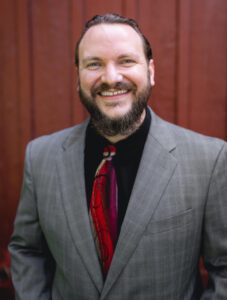 Mark Hightower is an operatic bass with a voice that has been described in one word: “Wow!” He was born in Baton Rouge, Louisiana, but grew up and lived most of his life in the greater Philadelphia area in Pennsylvania. After receiving his Master’s degree from Westminster Choir College in 2008, Mark became an accomplished choral director and high school teacher in South Carolina and then in the suburbs of Philadelphia. Throughout his 15-year teaching career, he and his choirs received many accolades including being crowned State Champions at the state choral festival as well as being honored as Teacher of the Year. Mark has since left the classroom behind to pursue his singing.
Mark Hightower is an operatic bass with a voice that has been described in one word: “Wow!” He was born in Baton Rouge, Louisiana, but grew up and lived most of his life in the greater Philadelphia area in Pennsylvania. After receiving his Master’s degree from Westminster Choir College in 2008, Mark became an accomplished choral director and high school teacher in South Carolina and then in the suburbs of Philadelphia. Throughout his 15-year teaching career, he and his choirs received many accolades including being crowned State Champions at the state choral festival as well as being honored as Teacher of the Year. Mark has since left the classroom behind to pursue his singing.
Hightower’s first professional solo opera engagement was in Morocco at the Théâtre National Mohammed V in Rabat. He has recently made his debuts on the opera stage in Italy, Germany, and the UK as well as making his American debuts with Opera Delaware and Opera Baltimore. He was also the bass soloist for a large number of regional productions, including a world premiere of Dan Forrest’s Creation with the Wayne Oratorio Society. Mark also enjoyed appearing and singing in Maestro, the new Bradley Cooper film about Leonard Bernstein. He is greatly looking forward to making his debuts with Princeton Pro Musica for Mozart’s Requiem in March and La Bohème with Yannick Nézet-Séguin and the Philadelphia Orchestra in June. This summer, Mark will move to Meiningen, Germany to begin a full-time position as the bass soloist at the Meininger Staatstheater. He looks forward to embarking on this exciting new stage of his career as well as indulging in the delicious German beer and bratwurst!
(To optimize view, rotate mobile devices to landscape orientation)
ST. FRANCIS' PRAYER
Lord, make me an instrument of thy Peace
Where there is hatred, let me sow love
Where there is injury, pardon
Where there is doubt, faith
Where there is despair, hope
Where there is darkness, light
And where there is sadness, joy.
O Divine Master, Grant that I may not seek
To be consoled as to console,
To be understood, as to understand
To be loved as to love
For it is in giving that we receive,
It is in pardoning that we are pardoned,
And it is in dying that we gain eternal life.
REGINA CAELI
Regina caeli, laetare, alleluia;
Quia quem meruisti portare, alleluia,
Resurrexit, sicut dixit, alleluia:
Ora pro nobis Deum, alleluia.
Queen of heaven, rejoice, alleluia.
The Son you merited to bear, alleluia,
Has risen as he said, alleluia.
Pray to God for us, alleluia.
THE CHARIOT JUBILEE
Down from the heavens, a golden chariot swinging,
Comes God’s promise of salvation.
Amen! Amen!
Hallelujah! Hallelujah!
Swing low, sweet chariot,
Coming for to carry me home,
Swing low, sweet chariot,
Coming for to carry me home!
God made a covenant,
For the glory of His grace
Through our Lord and Saviour Jesus Christ.
His gospel, full and free,
Like a chariot swung from heav’n,
Shall bear the true believer home,
Safely home.
Salvation, sweet cov’nant of the Lord,
I shall ride up in that chariot in that morning.
Tell it, tell it!
He who doth in Christ believe,
Though he were dead,
Yet shall he live.
King Jesus triumphed o’er the grave!
His grace alone
Can sinners save.
O Hallelujah
PORTRAITS: DOUGLASS & TUBMAN
I. Do Right | By Frederick Douglass
I would unite with anybody to do right, and with
nobody to do wrong.
II. Moral Growth | By Frederick Douglass
The moral growth of a great nation requires
reflection as well as observation to appreciate it.
III. Death or Liberty | By Harriet Tubman
I got a right to two things: that’s death or liberty;
I mean to have but one. No one will take me back
alive; I shall fight for my liberty.
IV. Every Great Dream | By Harriet Tubman
Every great dream begins with a dreamer. Always
remember you have within you the strength, the
patience, and the passion to reach for the stars,
to change the world.
INTROIT |
|||
| I. Requiem | |||
| Requiem aeternam dona eis, Domine, et lux perpetua luceat eis. Te decet hymnus, Deus, in Sion, et tibi reddetur votum in Jerusalem. Exaudi orationem meam, ad te omnis care veniet. Requiem aeternam dona eis, Domine, et lux perpetua luceat eis. |
Eternal rest grant to them, O Lord, and let perpetual light shine upon them. To you a song of praise, O God, in Zion, and to you a vow shall be paid in Jerusalem.Answer my prayer, to you all flesh shall come. Eternal rest grant to them, O Lord, and let perpetual light shine upon them. |
||
| II. Kyrie | |||
| Kyrie, eleison. Christe, eleison Kyrie, eleison. |
Lord, have mercy on us. Christ, have mercy on us. Lord, have mercy on us. |
||
| SEQUENCE
Dies Irae |
|||
| Dies irae, dies illa Solvet saeclum in favilla, teste David cum Sibylla. Quantus tremor est futurus, quando judex est venturus, cuncta stricte discussurus! |
Day of wrath, day of anger will dissolve the world in ashes, as foretold by David and the Sibyl. Great trembling there will be when the Judge descends from heaven to examine all things closely! |
||
| Tuba mirum | |
| Tuba mirum spargens sonum per sepulcra regionum, coget omnes ante thronum. Mors stupebit et natura, cum resurget creatura, judicanti responsura. Liber scriptus proferetur, in quo totum continetur, unde mundus judicetur. Judex ergo cum sedebit, quidquid latet,apparebit, nil inultum remanebit.Quid sum miser tunc dicturus? quem patronum rogaturus, cum vix justus sit securus? |
The trumpet will send its wondrous sound throughout earth's sepulchres and gather all before the throne. Death and nature will be astounded, when all creation rises again, to answer the judgement. A book will be brought forth, n which all will be written, by which the world will be judged. When the judge takes his place, what is hidden will be revealed, nothing will remain unavenged.What shall a wretch like me say? Who shall intercede for me, when the just ones need mercy? |
| Rex Tremendae | |
| Rex tremendae majestatis, qui salvandos savas gratis, salve me, fons pietatis. |
King of tremendous majesty, who freely saves those worthy ones, save me, source of mercy. |
| Recordare | |
| Recordare, Jesu pie, quod sum causa tuae viae; ne me perdas illa die. Quaerens me, sedisti lassus, redemisti crucem passus; tantus labor non sit cassus. Juste judex ultionis, donum fac remissionis ante diem rationis. Ingemisco, tamquam reus: culpa rubet vultus meus; supplicanti parce, Deus.Qui Mariam absolvisti, et latronem exaudisti, mihi quoque spem dedisti. Preces meae non sunt dignae, sed tu, bonus, fac benigne, ne perenni cremer igne.Inter oves locum praesta, Et ab haedis me sequestra, Statuens in parte dextra. |
Remember, kind Jesus, my salvation caused your suffering; do not forsake me on that day. Faint and weary you have sought me, redeemed me, suffering on the cross; may such great effort not be in vain. Righteous judge of vengeance, grant me the gift of absolution before the day of retribution. I moan as one who is guilty: owning my shame with a red face; suppliant before you, Lord.You, who absolved Mary, and listened to the thief, give me hope also. My prayers are unworthy, but, good Lord, have mercy, and rescue me from eternal fire.Provide me a place among the sheep, and separate me from the goats, guiding me to Your right hand. |
| Confutatis | |
| Confutatis maledictis, flammis acribus addictis, voca me cum benedictus.Oro supplex et acclinis, cor contritum quasi cinis, gere curam mei finis. |
When the accused are confounded, and doomed to flames of woe, call me among the blessed.I kneel with submissive heart, my contrition is like ashes, help me in my final condition. |
| Lacrimosa | |
| Lacrimosa dies illa, qua resurget ex favilla judicandus homo reus Huic ergo parce, Deus, pie Jesu Domine, dona eis requiem. Amen. |
That day of tears and mourning, when from the ashes shall arise, all humanity to be judged. Spare us by your mercy, Lord, gentle Lord Jesus, grant them eternal rest. Amen. |
| OFFERTORY | |
| Domine Jesu | |
| Domine Jesu Christe, Rex gloriae, libera animas omnium fidelium, defunctorum de poenis inferni et de profundo lacu. Libera eas de ore leonis, ne absorbeat eas tartarus, ne cadant in obscurum. Sed signifer sanctus Michael repraesentet eas in lucem sanctam. Quam olim Abrahae promisisti et semini ejus. |
Lord Jesus Christ, King of glory, liberate the souls of the faithful, departed from the pains of hell and from the bottomless pit. Deliver them from the lion's mouth, lest hell swallow them up, lest they fall into darkness. Let the standard-bearer, holy Michael, bring them into holy light. Which was promised to Abraham and his descendants. |
| Hostias | |
| Hostias et preces tibi, Domine, laudis offerimus. Tu sucipe pro animabus illis, quaram hodie memoriam facimus. Fac eas, Domine, de morte transire ad vitam, Quam olim Abrahae promisisti et semini ejus. |
Sacrifices and prayers of praise, Lord, we offer to You. Receive them in behalf of those souls we commemorate today. And let them, Lord, pass from death to life, which was promised to Abraham and his descendants. |
| Agnus Dei | |
| Agnus Dei, qui tollis peccata mundi, dona eis requiem. Agnus Dei, qui tollis peccata mundi, dona eis requiem. Agnus Dei, qui tollis peccata mundi, dona eis requiem sempiternam. |
Lamb of God, who takes away the sins of the world, grant them eternal rest. Lamb of God, who takes away the sins of the world, grant them eternal rest. Lamb of God, who takes away the sins of the world, grant them eternal rest forever. |
| COMMUNION | |
| Lux Aeterna | |
| Lux aeterna luceat eis, Domine, cum sanctis tuis in aeternum, quia pius es. Requiem aeternum dona eis, Domine, et Lux perpetua luceat eis, cum Sanctus tuis in aeternum, quia pius es. |
Let eternal light shine on them, Lord, as with Your saints in eternity, because You are merciful. Grant them eternal rest, Lord, and let perpetual light shine on them, as with Your saints in eternity, because You are merciful. |
| SOPRANO Blessing Agunwamba Marie Altobelli Rose Ananthanayagam Gail Balog Kalyani Bhatt Stephanie Brown Dorothy Cassimatis Sally Chrisman Sidnee Curtis Harikanta Didi-Ogren Sandra Black Duffy Christine Elsner Angel Gardner Candus Hedberg Eleanor Hubbard Jan Johnson Judith Johnston Carol Johnston Kimberlynn Kleasen Jane Kleindienst Kathy Korwin Maureen Kyle Teri Lindstrom Marjorie Morse Bela Nakum Rebekah Nawalinski Emma Noyelle Sandra Noyelle Kathleen Spoto Jody Stebbins Marilee Thompson Sophie Travis Emily Van Buskirk Peggy Waldron Norah Wasden TENOR |
ALTO LaVerna Albury Erica Townsend Appel Eliana Barwinski Sue Begent Janet Breslin Elaine R. Clisham Lisa Dacuk-Julius Lori Del Negro Hazel Eaton Lisa Forrester Linda Gardner Louise Gross Ellen Harrison Joyce Irwin Malgorzata Jagiello Melissa Kettner Olga Kronenberg Carolyn P. Landis Nina Lucas Sara Maldonado Susan Metz Dianne D. Miles Fernanda Muccilli Jean Parsons Janet Perkins Fran Perlman Ellen Petrone Rebecca Phillips Karen Repka Sarah Sensenig Marie-Diane Tenney Becky Worrell BASS |
Glassbrook Vocal Ensemble
Chaequan Anderson, Artistic Director
Teresa-Marie Gotanco, Collaborative Pianist
| SOPRANO Olivia Benson Jade Blocker Stephanie Tubiolo-Fistonich Nicole Michel Kelsey Rose TENOR |
ALTO Alice Beals Brandi McLeod Bess Anne Ploener Deborah Gwynne Alissa Poh BASS |

Chaequan Anderson is an active choral conductor and music educator based in Central New Jersey. Mr. Anderson has varied choral experience directing school, community youth and children, and professional choirs. He has held positions with local organizations such as the Trenton Children’s Chorus, Westminster Community Conservatory, and the Princeton Girlchoir. He has also appeared as a guest conductor, presenter, and clinician with regional/festival ensembles and conferences in Delaware, Massachusetts, Maine, New Jersey, and Pennsylvania.
In addition to his work with Glassbrook, Chaequan serves as the Director of Middle School Choirs at Montclair Kimberley Academy, Associate Director and Conductor (Cantores) at Princeton Girlchoir, and Director of Music Ministry at First Presbyterian Church Verona.
He holds a Bachelor of Arts in Music from Westminster Choir College, Kodály Certification Levels I and II, and he is completing a Master of Music in Choral Conducting at Rutgers University-New Brunswick. He is also a member of the American Choral Directors Association, the National Association for Music Educators, the Organization of American Kodály Educators, the National Association of Negro Musicians, and the New Jersey Music Educators Association.
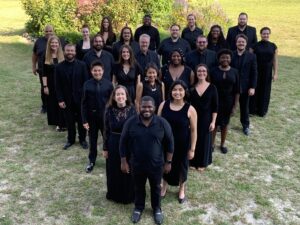 Celebrating its seventh season, Glassbrook Vocal Ensemble is a professional-level choir based in Ewing, New Jersey, seeking to enrich the lives of those in diverse communities by supplying the highest caliber of choral music-making. Glassbrook Vocal Ensemble presents captivating concert experiences through collaboration with local musicians, arts organizations, and venues. The choir balances traditional choral music with premieres of new compositions to create varied programs for modern audiences. The ensemble has quickly made a name for itself in the greater tri-state area and has performed in venues across New Jersey and Philadelphia.
Celebrating its seventh season, Glassbrook Vocal Ensemble is a professional-level choir based in Ewing, New Jersey, seeking to enrich the lives of those in diverse communities by supplying the highest caliber of choral music-making. Glassbrook Vocal Ensemble presents captivating concert experiences through collaboration with local musicians, arts organizations, and venues. The choir balances traditional choral music with premieres of new compositions to create varied programs for modern audiences. The ensemble has quickly made a name for itself in the greater tri-state area and has performed in venues across New Jersey and Philadelphia.
 Tenor Dr. Darian Clonts is a native of Atlanta, Ga., where he attended the Cobb County Center for Excellence in the Performing Arts (CCCEPA) at Pebblebrook High School as a vocal major. He earned a Bachelor of Arts degree from Morehouse College in Atlanta, where he studied voice under Dr. Uzee Brown, Jr. He was a member, soloist, and accompanist of the world-renowned Morehouse College Glee Club, under the direction of Dr. David Morrow. Dr. Clonts received his Master of Music degree and Doctor of Music degree from the Jacobs School of Music at Indiana University, where he studied voice with Dr. Brian Horne. While attending Indiana University, he earned a minor in Musicology and a certificate in Vocology.
Tenor Dr. Darian Clonts is a native of Atlanta, Ga., where he attended the Cobb County Center for Excellence in the Performing Arts (CCCEPA) at Pebblebrook High School as a vocal major. He earned a Bachelor of Arts degree from Morehouse College in Atlanta, where he studied voice under Dr. Uzee Brown, Jr. He was a member, soloist, and accompanist of the world-renowned Morehouse College Glee Club, under the direction of Dr. David Morrow. Dr. Clonts received his Master of Music degree and Doctor of Music degree from the Jacobs School of Music at Indiana University, where he studied voice with Dr. Brian Horne. While attending Indiana University, he earned a minor in Musicology and a certificate in Vocology.
Clonts has an extensive performing career that spans various genres of music, from opera to gospel. Clonts has performed with several prestigious opera companies, including Cincinnati Opera, The Utah Festival Opera and Musical Theater, The Princeton Festival, The Atlanta Opera, and the Indiana University Opera Theater. Some of his operatic roles include Benvolio (Roméo et Juliette), The Witch (Hansel and Gretel), Mingo (Porgy and Bess), Hérrison (L’Étoile), Goro (Madama Butterfly), and El Remendado (Carmen).
Clonts is member of the Music & Worship Arts staff at Elmwood United Presbyterian Church in East Orange, NJ., and serves on the Board of Directors for the New York City Chapter of the National Association of Teachers of Singing. He also holds memberships with the National Association of Negro Musicians, the African American Art Song Alliance, the Collegiate Music Society, and Kappa Alpha Psi Fraternity, Inc. In the summer of 2022, Clonts was selected to participate in the National Association of Teachers of Singing Intern program. He is currently a voice faculty member at the John J. Cali School of Music at Montclair State University, and William Paterson University. In addition to his faculty positions, he also maintains a private voice studio of students from various age groups. Clonts taught as an associate instructor at Indiana University in the department of African American and African Diaspora Studies. The main focus of his musical research includes opera and African American music, and he has lectured on his research at schools and institutions across the United States.
| Violin 1 Urara Mogi, Concertmaster Sayuri Lyons, The Frank L. Biletsky Chair Margaret Banks William Barney Stevens Gabriel Schaff Linda HowardViolin 2 Marina Fragoulis Mioi Takeda Samuel Gray Yu Ouyang Denise Stillwell Sarah Franklin Viola Cello Bass Flute |
Clarinet David Gould Bohdan HilashBassoon Gili Sharett Atsuko Sato French Horn Trumpet Trombone Organ Timpani Percussion Personnel Manager |
PRINCETON PRO MUSICA
Ryan James Brandau, Artistic Director
Mary Trigg, Executive Director
Kenny Litvack, Marketing Manager
Eric Plutz, Keyboard Artist
Frances Fowler Slade, Artistic Director Emeritus
BOARD OF TRUSTEES
Jan Johnson, President
Erica Appel, Vice President
Claudia Classon, Secretary
Greg Sarjeant, Treasurer
Elaine Clisham
Lisa Dacuk-Julius
Angel Gardner
William McCormack
Melissa Scott
Daniel Spira
Ann Strootman
Ryan Brandau, ex officio
Mary Trigg, ex officio
ARTISTIC ADVISORY BOARD
Marguerite Brooks
Vinroy D. Brown, Jr.
Simon Carrington
Gabriel Crouch
Dominick Diorio
Wendy Heller
Joe Miller
Michael Pratt
Amanda Quist
Frances Fowler Slade
Zachary Wadsworth
Jonathan Woody
ACKNOWLEDGEMENTS
Princeton Pro Musica wishes to thank the following individuals and organizations for providing their special help:
Discover Jersey Arts
New Jersey State Council on the Arts
Princeton Area Community Foundation
Princeton Mercer Chamber of Commerce
Regina Opera Company for their Supertitles template
Allegra ⧫ Marketing ⧫ Print ⧫ Mail ⧫ Design
Mineko Ogata - Supertitles Operator
Baroque Keyboards
VOLUNTEER COORDINATOR
Janet Breslin
BOOKKEEPER
Maureen Kyle
CONCERT HOUSE STAFF
Kevin Dziuba
CONCERT MANAGER
Dianne D. Miles
DIGITAL PROGRAM
Dianne D. Miles
CHAMBER CHORUS COORDINATOR
Fran Perlman
MUSIC COORDINATOR
Joseph Chang
Janet Breslin
Bernard McMullan
OFFICE ASSISTANT
Janet Perkins
SECTION LEADERS
Candus Hedberg, soprano
Lisa Dacuk-Julius, alto
Gary Gregg, tenor
Devon Grant, bass
SUPERTITLES
Mineko Ogata
WEBMASTER
Kenny Litvack



